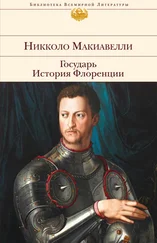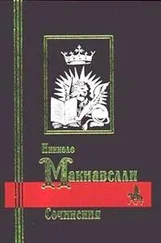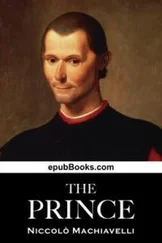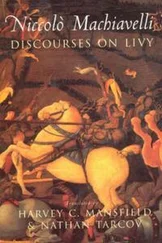Николо Макиавелли - History of Florence and of the Affairs of Italy
Здесь есть возможность читать онлайн «Николо Макиавелли - History of Florence and of the Affairs of Italy» весь текст электронной книги совершенно бесплатно (целиком полную версию без сокращений). В некоторых случаях можно слушать аудио, скачать через торрент в формате fb2 и присутствует краткое содержание. Год выпуска: 2014, Издательство: epubBooks Classics, Жанр: История, на английском языке. Описание произведения, (предисловие) а так же отзывы посетителей доступны на портале библиотеки ЛибКат.
- Название:History of Florence and of the Affairs of Italy
- Автор:
- Издательство:epubBooks Classics
- Жанр:
- Год:2014
- ISBN:нет данных
- Рейтинг книги:3 / 5. Голосов: 1
-
Избранное:Добавить в избранное
- Отзывы:
-
Ваша оценка:
- 60
- 1
- 2
- 3
- 4
- 5
History of Florence and of the Affairs of Italy: краткое содержание, описание и аннотация
Предлагаем к чтению аннотацию, описание, краткое содержание или предисловие (зависит от того, что написал сам автор книги «History of Florence and of the Affairs of Italy»). Если вы не нашли необходимую информацию о книге — напишите в комментариях, мы постараемся отыскать её.
History of Florence and of the Affairs of Italy — читать онлайн бесплатно полную книгу (весь текст) целиком
Ниже представлен текст книги, разбитый по страницам. Система сохранения места последней прочитанной страницы, позволяет с удобством читать онлайн бесплатно книгу «History of Florence and of the Affairs of Italy», без необходимости каждый раз заново искать на чём Вы остановились. Поставьте закладку, и сможете в любой момент перейти на страницу, на которой закончили чтение.
Интервал:
Закладка:
There were at this time in Florence some people of Perugia, whom party feuds had compelled to leave their homes; and the Pazzi, by promising to restore them to their country, obtained their assistance. The Archbishop de' Salviati, going to seize the palace, together with Jacopo di Poggio, and the Salviati, his friends, took these Perugini with him. Having arrived, he left part of his people below, with orders that when they heard a noise they should make themselves masters of the entrance, while himself, with the greater part of the Perugini, proceeded above, and finding the Signory at dinner (for it was now late), was admitted after a short delay, by Cesare Petrucci, the Gonfalonier of Justice. He entered with only a few of his followers, the greater part of them being shut up in the cancelleria into which they had gone, whose doors were so contrived, that upon closing they could not be opened from either side, without the key. The archbishop being with the gonfalonier, under pretense of having something to communicate on the part of the pope, addressed him in such an incoherent and hesitating manner, that the gonfalonier at once suspected him, and rushing out of the chamber to call assistance, found Jacopo di Poggio, whom he seized by the hair of the head, and gave into the custody of his attendants. The Signory hearing the tumult, snatched such arms as they could at the moment obtain, and all who had gone up with the archbishop, part of them being shut up, and part overcome with terror, were immediately slain or thrown alive out of the windows of the palace, at which the archbishop, the two Jacopi Salviati, and Jacopodi Poggio were hanged. Those whom the archbishop left below, having mastered the guard and taken possession of the entrance occupied all the lower floors, so that the citizens, who in the uproar, hastened to the palace, were unable to give either advice or assistance to the Signory.
Francesco de' Pazzi and Bernardo Bandini, perceiving Lorenzo's escape, and the principal agent in the enterprise seriously wounded, became immediately conscious of the imminent peril of their position. Bernardo, using the same energy in his own behalf that had served him against the Medici, finding all lost, saved himself by flight. Francesco, wounded as he was, got to his house, and endeavored to get on horseback, for it had been arranged they should ride through the city and call the people to arms and liberty; but he found himself unable, from the nature of his wound, and, throwing himself naked upon his bed, begged Jacopo de' Pazzi to perform the part for which he was himself incapacitated. Jacopo, though old and unaccustomed to such business, by way of making a last effort, mounted his horse, and, with about a hundred armed followers, collected without previous preparation, hastened to the piazza of the palace, and endeavored to assemble adherents by cries of "people," and "liberty;" but the former, having been rendered deaf by the fortune and liberty of the Medici, the latter was unknown in Florence, and he found no followers. The signors, who held the upper part of the palace, saluted him with stones and threats. Jacopo, while hesitating, was met by Giovanni Seristori, his brother–in–law, who upbraided him with the troubles he had occasioned, and then advised him to go home, for the people and liberty were as dear to other citizens as to himself. Thus deprived of every hope, Lorenzo being alive, Francesco seriously wounded, and none disposed to follow him, not knowing what to do, he resolved, if possible, to escape by flight; and, accompanied by those whom he had led into the piazza, left Florence with the intention of going into Romagna.
In the meantime the whole city was roused to arms, and Lorenzo de' Medici, accompanied by a numerous escort, returned to his house. The palace was recovered from its assailants, all of whom were either slain or made prisoners. The name of the Medici echoed everywhere, and portions of dead bodies were seen borne on spears and scattered through the streets; while everyone was transported with rage against the Pazzi, and pursued them with relentless cruelty. The people took possession of their houses, and Francesco, naked as they found him, was led to the palace, and hanged beside the archbishop and the rest. He could not be induced, by any injurious words or deeds, to utter a syllable, but regarding those around with a steady look, he silently sighed. Guglielmo de' Pazzi, brother–in–law to Lorenzo, fled to the latter's house, and by his innocence and the intercession of his wife, Bianca, he escaped death. There was not a citizen of any rank whatever who did not, upon this occasion, wait upon Lorenzo with an offer of his services; so great were the popularity and good fortune which this family had acquired by their liberality and prudence. Rinato de' Pazzi was at his villa when the event took place, and on being informed of it, he endeavored to escape in disguise, but was arrested upon the road and brought to Florence. Jacopo de' Pazzi was taken while crossing the mountains of Romagna, for the inhabitants of these parts having heard what had occurred, and seeing him in flight, attacked and brought him back to the city; nor could he, though he frequently endeavored, prevail with them to put him to death upon the road. Jacopo and Rinato were condemned within four days after the murder of Giuliano. And though so many deaths had been inflicted that the roads were covered with fragments of human bodies, not one excited a feeling of regret, except that of Rinato; for he was considered a wise and good man, and possessed none of the pride for which the rest of his family were notorious. As if to mark the event by some extraordinary circumstance, Jacopo de' Pazzi, after having been buried in the tomb of his ancestors, was disinterred like an excommunicated person, and thrown into a hole at the outside of the city walls; from this grave he was taken, and with the halter in which he had been hanged, his body was dragged naked through the city, and, as if unfit for sepulture on earth, thrown by the populace into the Arno, whose waters were then very high. It was an awful instance of the instability of fortune, to see so wealthy a man, possessing the utmost earthly felicity, brought down to such a depth of misery, such utter ruin and extreme degradation. It is said he had vices, among which were gaming and profane swearing, to which he was very much addicted; but these seem more than balanced by his numerous charities, for he relieved many in distress, and bestowed much money for pious uses. It may also be recorded in his favor, that upon the Saturday preceding the death of Giuliano, in order that none might suffer from his misfortunes, he discharged all his debts; and whatever property he possessed belonging to others, either in his own house or his place of business, he was particularly careful to return to its owners. Giovanni Batista da Montesecco, after a long examination, was beheaded; Napoleone Franzesi escaped punishment by flight; Giulielmo de' Pazzi was banished, and such of his cousins as remained alive were imprisoned in the fortress of Volterra. The disturbances being over, and the conspirators punished, the funeral obsequies of Giuliano were performed amid universal lamentation; for he possessed all the liberality and humanity that could be wished for in one of his high station. He left a natural son, born some months after his death, named Giulio, who was endowed with that virtue and felicity with which the whole world is now acquainted; and of which we shall speak at length when we come to our own times, if God spare us. The people who had assembled in favor of the Pazzi under Lorenzo da Castello in the Val di Tavere, and under Giovan Francesco da Tolentino in Romagna, approached Florence, but having heard of the failure of the conspiracy, they returned home.
The changes desired by the pope and the king in the government of Florence, not having taken place, they determined to effect by war what they had failed to accomplish by treachery; and both assembled forces with all speed to attack the Florentine states; publicly declaring that they only wished the citizens to remove Lorenzo de' Medici, who alone of all the Florentines was their enemy. The king's forces had already passed the Tronto, and the pope's were in Perugia; and that the citizens might feel the effect of spiritual as well as temporal weapons, the pontiff excommunicated and anathematized them. Finding themselves attacked by so many armies, the Florentines prepared for their defense with the utmost care. Lorenzo de' Medici, as the enemy's operations were said to be directed against himself alone, resolved first of all to assemble the Signory, and the most influential citizens, in the palace, to whom, being above three hundred in number, he spoke as follows:—"Most excellent signors, and you, magnificent citizens, I know not whether I have more occasion to weep with you for the events which have recently occurred, or to rejoice in the circumstances with which they have been attended. Certainly, when I think with what virulence of united deceit and hatred I have been attacked, and my brother murdered, I cannot but mourn and grieve from my heart, from my very soul. Yet when I consider with what promptitude, anxiety, love, and unanimity of the whole city my brother has been avenged and myself defended, I am not only compelled to rejoice, but feel myself honored and exalted; for if experience has shown me that I had more enemies than I apprehended, it has also proved that I possess more warm and resolute friends than I could ever have hoped for. I must therefore grieve with you for the injuries others have suffered, and rejoice in the attachment you have exhibited toward myself; but I feel more aggrieved by the injuries committed, since they are so unusual, so unexampled, and (as I trust you believe) so undeserved on our part. Think, magnificent citizens, to what a dreadful point ill fortune has reduced our family, when among friends, amidst our own relatives, nay, in God's holy temple, we have found our greatest foes. Those who are in danger turn to their friends for assistance; they call upon their relatives for aid; but we found ours armed, and resolved on our destruction. Those who are persecuted, either from public or private motives, flee for refuge to the altars; but where others are safe, we are assassinated; where parricides and assassins are secure, the Medici find their murderers. But God, who has not hitherto abandoned our house, again saved us, and has undertaken the defense of our just cause. What injury have we done to justify so intense desire of our destruction? Certainly those who have shown themselves so much our enemies, never received any private wrong from us; for, had we wished to injure them, they would not have had an opportunity of injuring us. If they attribute public grievances to ourselves (supposing any had been done to them), they do the greater injustices to you, to this palace, to the majesty of this government, by assuming that on our account you would act unfairly to any of your citizens; and such a supposition, as we all know, is contradicted by every view of the circumstances; for we, had we been able, and you, had we wished it, would never have contributed to so abominable a design. Whoever inquires into the truth of these matters, will find that our family has always been exalted by you, and from this sole cause, that we have endeavored by kindness, liberality, and beneficence, to do good to all; and if we have honored strangers, when did we ever injure our relatives? If our enemies' conduct has been adopted, to gratify their desire for power (as would seem to be the case from their having taken possession of the palace and brought an armed force into the piazza), the infamous, ambitious, and detestable motive is at once disclosed. If they were actuated by envy and hatred of our authority, they offend you rather than us; for from you we have derived all the influence we possess. Certainly usurped power deserves to be detested; but not distinctions conceded for acts of kindness, generosity, and magnificence. And you all know that our family never attained any rank to which this palace and your united consent did not raise it. Cosmo, my grandfather, did not return from exile with arms and violence, but by your unanimous desire and approbation. It was not my father, old and inform, who defended the government against so many enemies, but yourselves by your authority and benevolence defended him; neither could I, after his death, being then a boy, have maintained the position of my house except by your favor and advice. Nor should we ever be able to conduct the affairs of this republic, if you did not contribute to our support. Therefore, I know not the reason of their hatred toward us, or what just cause they have of envy. Let them direct their enmity against their own ancestors, who, by their pride and avarice, lost the reputation which ours, by very opposite conduct, were enabled to acquire. But let it be granted we have greatly injured them, and that they are justified in seeking our ruin; why do they come and take possession of the palace? Why enter into league with the pope and the king, against the liberties of this republic? Why break the long–continued peace of Italy? They have no excuse for this; they ought to confine their vengeance to those who do them wrong, and not confound private animosities with public grievances. Hence it is that since their defeat our misfortune is the greater; for on their account the pope and the king make war upon us, and this war, they say, is directed against my family and myself. And would to God that this were true; then the remedy would be sure and unfailing, for I would not be so base a citizen as to prefer my own safety to yours; I would at once resolve to ensure your security, even though my own destruction were the immediate and inevitable consequence. But as the wrongs committed by princes are usually concealed under some less offensive covering, they have adopted this plea to hide their more abominable purpose. If, however, you think otherwise, I am in your hands; it is with you to do with me what you please. You are my fathers, my protectors, and whatever you command me to do I will perform most willingly; nor will I ever refuse, when you find occasion to require it, to close the war with my own blood which was commenced with that of my brother." While Lorenzo spoke, the citizens were unable to refrain from tears, and the sympathy with which he had been heard was extended to their reply, delivered by one of them in the name of the rest, who said that the city acknowledged many advantages derived from the good qualities of himself and his family; and encouraged them to hope that with as much promptitude as they had used in his defense, and in avenging his brother's death, they would secure to him his influence in the government, which he should never lose while they retained possession of the country. And that their deeds might correspond with their words, they immediately appointed a number of armed men, as a guard for the security of his person against domestic enemies.
Читать дальшеИнтервал:
Закладка:
Похожие книги на «History of Florence and of the Affairs of Italy»
Представляем Вашему вниманию похожие книги на «History of Florence and of the Affairs of Italy» списком для выбора. Мы отобрали схожую по названию и смыслу литературу в надежде предоставить читателям больше вариантов отыскать новые, интересные, ещё непрочитанные произведения.
Обсуждение, отзывы о книге «History of Florence and of the Affairs of Italy» и просто собственные мнения читателей. Оставьте ваши комментарии, напишите, что Вы думаете о произведении, его смысле или главных героях. Укажите что конкретно понравилось, а что нет, и почему Вы так считаете.












